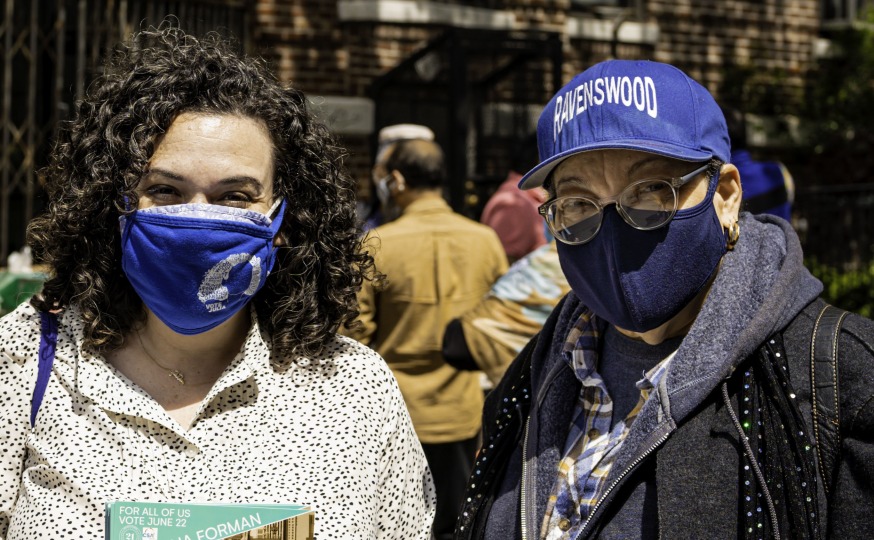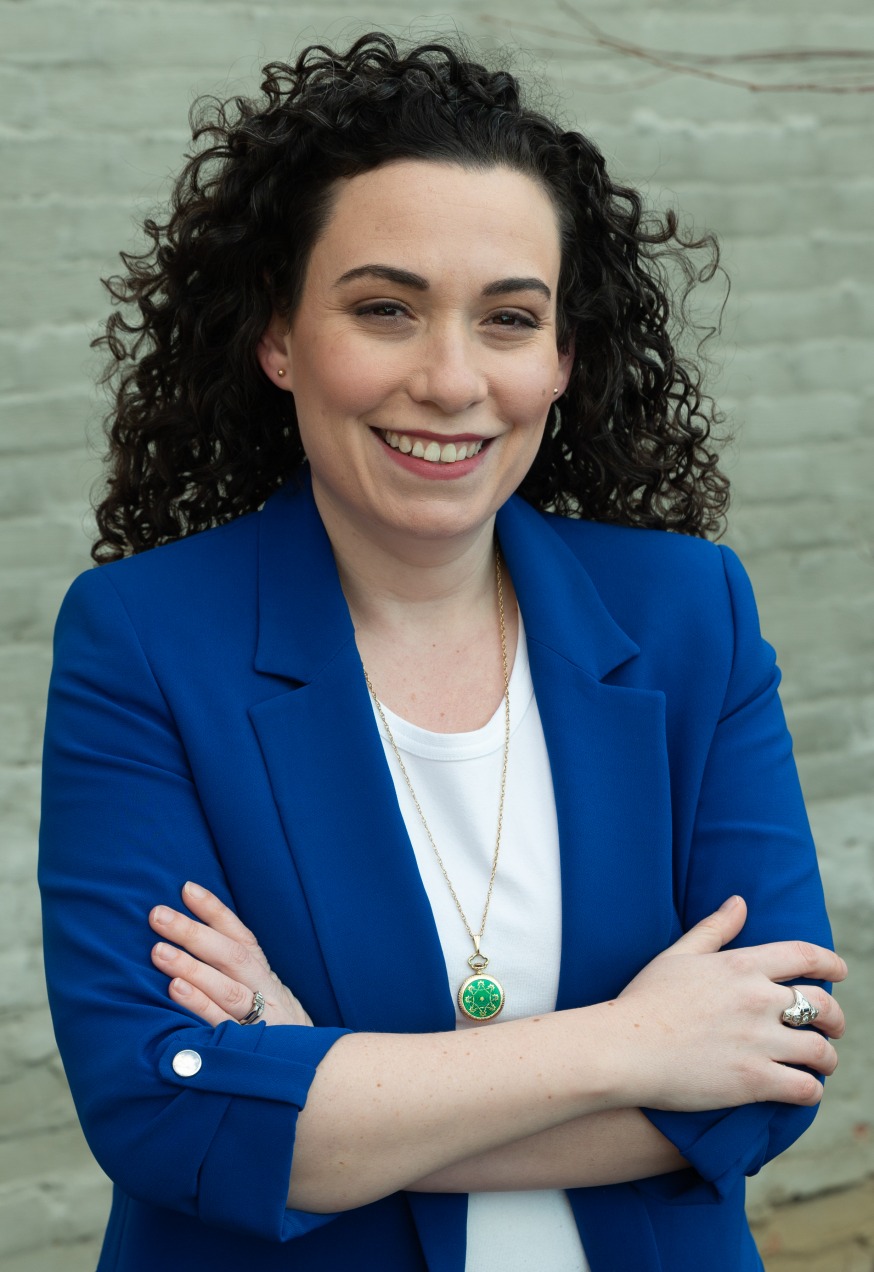
City Council candidate Julia Forman and community member Carol Wilkins. (Photo courtesy of: Julia Forman)
May 20, 2021 Op-Ed By: Julia Forman
As a pandemic that brought disproportionate harm to our senior neighbors raged through the city, our government sputtered.
Communications were focused on text and internet messages and those on the other side of the digital divide struggled to get the same information as our younger citizens. Vaccine sign-ups were hampered by technology even millennials found burdensome.
And as New York State has pushed to reopen, our senior centers have remained closed even to the vaccinated, prolonging a year of dispiriting solitude. Starting in March of 2020, I worked with the three mutual aid organizations serving Western Queens to create call lists of neighbors aged 65 and older.
Volunteers across District 26 took on the responsibility of reaching out to these neighbors to check in, provide information, run errands, address food insecurity, or simply serve as a friendly ear during a time of social and informational isolation.
I’m proud to have joined my neighbors in helping our elder community, but the truth is that this kind of work should never have depended on a large-scale volunteer effort. It is absolutely critical that the incoming city council get to work right away to strengthen the social safety net that has been letting our senior citizens fall through the gaps for entirely too long.
This week, after working with city council candidates Evie Hantzopoulos (District 22) and Ingrid Gomez (District 21), we have released our comprehensive Seniors Platform. Much of the platform was inspired by experiences and observations of government failures over the past year as well as conversations with seniors right in our own districts.
I’d like to share some highlights of our platform. First, while our aging population is constantly growing across New York City, the funding allocated to the Department for the Aging (DFTA) is only 0.5% of the entire municipal budget. Non-profit organizations that serve this population are often at the mercy of discretionary funding, which can vary greatly from year to year, curtailing efforts to plan ahead or guarantee consistent service.
We must increase the funding to DFTA and make NPO funding permanent so that the services they provide can be expanded and secured from year to year. While scaling up the availability of services to seniors, we must also open more publicly funded senior centers to accommodate the daily needs of our senior population including social activities, meals, access to information, and opportunities to interface with social workers to address their personal needs or concerns.

City Council Candidate for District 26 Julia Forman (Photo: votejulia.com)
I have also heard many concerns about housing for seniors, both for those who want to remain in their homes and those that would like to have the option to move into senior specific housing. Both of these groups must be taken care of and their needs responded to.
When it comes to development in Western Queens, we must work to identify locations for 100% affordable housing specifically dedicated to seniors, that is designed to be accessible to all and where the services necessary to support independent living are either in the building or directly nearby.
For those who would prefer to stay in their home, funding should be available for upgrades to make existing homes safer and more accessible.
We can also increase independence for senior living by raising the income requirement for the Senior Citizen Rent Increase Exemption (SCRIE) and Senior Citizen Homeowners Exemption (SCHE) so that seniors on tight fixed incomes qualify for rent freezes and property tax assistance.
DFTA social workers should be made available to navigate existing rental assistance programs from all levels of government, ensuring that these seniors are not pushed out of their homes.
We must also ensure that the in-home healthcare workers that care for them can make a living wage and are cared for by passing legislation to include protection for domestic workers under the human rights law’s definition of an employer (Int 0339-2018), to expand access to paid leave and to protect all workers from retaliation (Int 0800), and to pressure our state lawmakers into passing the Fair Pay for Homecare Act (S5374).
Finally, we cannot ignore the probability of another emergency hitting New Yorkers, whether health or weather related, and we must turn the lessons we learned early on in the Covid-19 pandemic into concrete steps to do better for our seniors in the future.
We must work with the Office of Emergency Management (OEM) to develop comprehensive, rapid response plans in collaboration with DFTA and existing organizations who work with seniors in our communities. This should include multilingual communication plans consisting of phone calls, mail, and, if possible, in-person outreach.
Moreover, while we should consistently fund a program to ensure meal delivery to any senior who needs it that is nutritious, culturally appropriate, and meets any necessary dietary restrictions, the emergency plan should include easy to navigate ways of scaling up this service and also offering delivery of ingredients for those that are able to cook for themselves.
As with many of the failures by our leadership at the federal, state, and local level, this pandemic exposed our systemic disregard for the seniors of New York City.
It’s time to foster a culture that values our elders and supports them in their golden years, respecting the work that they have done to build our city up through their lives. Through this comprehensive plan to support our DFTA and senior community, I am ready to play a part in making that happen.
Julia Forman is a city council candidate running to represent District 26, which covers Sunnyside, Woodside, Long Island City, Dutch Kills and a portion of Astoria
5 Comments

Would be nice if the city created lanes for seniors and the disabled only. Much like bike lanes but also allow motorized walking aids such as electric wheelchairs.
The city should use the social workers that are not responding to 911 calls to talk to seniors and help them cope call it “Aging in the city”.
The complex job of meeting our senior citizens many needs are often carried out by very low-paid home care workers. They should not be making the same wage as someone running a cash register in a drug store. Wages need a major increase. Perhaps you can lobby to establish the 30% increase City Council members voted in for themselves a few years ago. A person with an education, certification or a license to for every aspect of a human being deserves adequate compensation.
We set up video surveillance to monitor my mom with her new health aide. We had to complain about her new aide because she was constantly on her phone and took very long naps. If have money and are older those aides take better care of you for the gifts. My well to do neighbor married his health aide.
I absolutely agree, thank you for bringing up this critical point. Though it wasn’t included in the op-ed, we did include fair compensation and improved employee rights for home health care workers in our Seniors platform. To read the full plan, please visit: https://votejulia.com/seniors/. And feel free to reach out if you have other thoughts or concerns that you’d like to discuss!